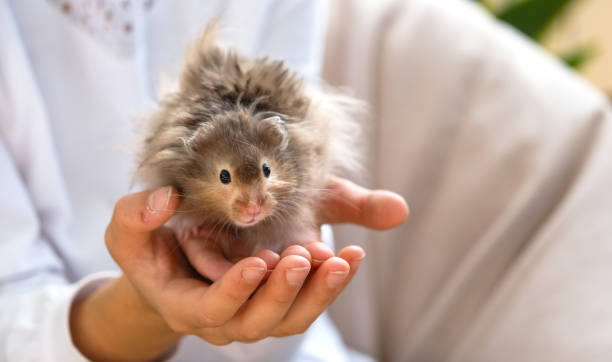
Fur and Care: Navigating the Differences Between Long-Haired and Short-Haired Rodents
Discover the essential care differences between long-haired and short-haired rodents, including grooming needs, health considerations, habitat setup, and behavior tips for happy, healthy pets.
🐶 Pet Star
26 min read · 23, Jul 2025

Introduction: Why Fur Length Matters in Rodent Care
When choosing a pet rodent, one of the first considerations beyond species is the type of fur they have. Long-haired and short-haired rodents differ not only in appearance but also in their care requirements, grooming needs, and potential health issues. This article explores these differences in depth, helping pet owners prepare for the unique challenges and joys of both fur types. Understanding these factors leads to better animal welfare and more rewarding companionship.
Understanding Rodent Fur Types: An Overview
What Defines Long-Haired vs. Short-Haired Rodents?
Rodent fur varies widely depending on the breed and species. Long-haired rodents feature fur that extends beyond a few centimeters, often requiring additional maintenance. Short-haired rodents have fur that lies close to the body, typically easier to care for.
Popular Rodent Species with Different Fur Lengths
- Long-Haired Rodents: Angora Guinea Pigs, Peruvian Guinea Pigs, Rex Rats, and some fancy hamster breeds.
- Short-Haired Rodents: American Guinea Pigs, Standard Fancy Rats, Syrian Hamsters, and Dwarf Hamsters.
Grooming Needs: The Biggest Care Difference
Daily and Weekly Grooming for Long-Haired Rodents
Long-haired rodents require regular brushing to prevent tangles, mats, and dirt buildup. For example, Angora guinea pigs often need daily grooming, while long-haired rats may require grooming several times a week. Neglecting this can lead to skin irritation and infections.
Minimal Grooming for Short-Haired Rodents
Short-haired rodents benefit from natural self-cleaning, requiring occasional brushing to remove loose fur and stimulate skin health. Weekly brushing is usually sufficient, with bathing rarely necessary.
Expert Tips for Effective Grooming
Veterinarians suggest using soft-bristled brushes and combs specifically designed for small animals. Regular nail trims during grooming sessions also promote health and comfort.
Health Considerations Linked to Fur Length
Skin and Coat Health
Long-haired rodents are prone to skin infections under matted fur and may suffer from parasites like mites more readily. Regular inspection during grooming helps catch issues early.
Temperature Regulation
Short-haired rodents may be more sensitive to cold due to less fur insulation, while long-haired rodents might be prone to overheating in hot environments because of thick coats.
Shedding Patterns and Allergies
Long-haired rodents shed differently, often releasing clumps of fur, which can exacerbate allergies for owners. Short-haired rodents shed more uniformly and generally cause fewer allergy problems.
Habitat Setup: Tailoring the Environment
Cage Size and Bedding Considerations
Long-haired rodents need bedding that reduces fur tangling and soiling, such as fleece liners or paper-based bedding. Short-haired rodents can tolerate a wider range of bedding types.
Humidity and Temperature Control
Maintaining proper humidity is critical for long-haired rodents to prevent dry skin and fur issues, while short-haired rodents typically adapt better to variable conditions.
Enrichment and Activity Needs
Both fur types require mental and physical stimulation, but long-haired rodents often enjoy spaces that allow them to move freely without risking fur damage.
Dietary Needs: Are They Different?
Nutritional Support for Coat Health
Long-haired rodents benefit from diets rich in omega-3 and omega-6 fatty acids, vitamins A and E, which promote shiny, healthy fur. Supplements may be considered under veterinary guidance.
General Nutrition for All Rodents
Regardless of fur length, rodents require a balanced diet of high-quality pellets, fresh vegetables, and unlimited hay. Proper hydration is crucial.
Behavioral Traits and Handling Tips
Impact of Fur on Handling
Long-haired rodents can be more sensitive to handling due to their delicate fur, requiring gentle and patient approaches. Short-haired rodents tend to be less affected by frequent handling.
Socialization and Temperament
Both long- and short-haired rodents have breed-specific temperaments, but grooming needs can influence how much interaction is practical for owners.
Common Challenges with Long-Haired Rodents
Preventing Matting and Fur Blockages
Regular grooming prevents painful mats and reduces the risk of fur ingestion, which can cause digestive issues.
Managing Fur in Daily Life
Long fur requires more frequent cleaning of living spaces and monitoring for soiling, which can impact the animal’s health.
Advantages of Short-Haired Rodents
Ease of Care for Busy Owners
Short-haired rodents require less grooming time, making them suitable for first-time or busy pet owners.
Lower Risk of Fur-Related Health Problems
With less fur, these rodents have fewer grooming-related health concerns, making their care more straightforward.
Specialized Equipment and Products
Grooming Tools for Long-Haired Rodents
Soft brushes, dematting combs, and even small animal grooming clippers are essential for maintaining long coats.
Cleaning and Bedding Products
Selecting low-dust bedding materials and hypoallergenic products supports skin and respiratory health for both rodent types.
Case Studies: Real-Life Experiences of Rodent Owners
Long-Haired Rodent Care Stories
Owners of long-haired rodents often share tips on managing grooming schedules and preventing fur issues.
Short-Haired Rodent Owner Insights
Short-haired rodent owners appreciate the ease of care but emphasize the importance of social interaction and enrichment.
Nutritional Supplements to Support Coat Quality
Omega Fatty Acids and Vitamin Boosts
Adding supplements rich in omega-3 and omega-6 fatty acids, like flaxseed oil or fish oil (in appropriate doses), supports fur sheen and skin hydration. Vitamins A and E are also essential for fur health and can be found in fresh greens or commercial pellets formulated for coat maintenance.
Avoiding Dietary Pitfalls
Owners should avoid overfeeding sugary treats or too many carbohydrates, which can negatively affect skin and fur. Balanced nutrition is fundamental to maintaining a healthy coat regardless of fur length.
Environmental Enrichment Tailored to Fur Type
Safe Exploration Spaces
Long-haired rodents may be more prone to fur damage during rough play or tight squeezes, so owners should design habitats with smooth surfaces and avoid rough materials that snag fur.
Interactive Toys and Puzzles
Both long- and short-haired rodents benefit from mentally stimulating toys, but careful selection ensures long fur doesn’t get caught or tangled. Soft fabric tunnels and chew toys with smooth finishes are ideal.
Handling Stress and Fur Maintenance
Stress-Reducing Handling Tips
Rodents with long fur may become stressed by frequent grooming if not accustomed early. Introducing grooming gradually and pairing sessions with treats helps reduce anxiety.
Signs of Handling Stress
Common signs include freezing, excessive grooming (overgrooming can lead to bald patches), or attempts to escape. Adjusting the approach to grooming and handling accordingly fosters better cooperation.
Rodent Social Dynamics and Fur Length
Group Living Considerations
In multi-rodent households, long fur can lead to increased grooming between animals, which is generally positive but can sometimes result in fur pulling or territorial disputes if not monitored.
Introducing New Rodents
When introducing new rodents, fur length may affect dominance displays. For example, long-haired rodents might appear larger and more imposing, which could influence social hierarchies.
Seasonal Shedding and Care Strategies
Spring and Fall Shedding
During seasonal molts, long-haired rodents shed large quantities of fur, requiring intensified grooming to prevent mats and ingestion of fur clumps.
Temperature-Related Fur Adjustments
Owners often trim or thin the fur in warmer months to aid cooling, while adding insulation through bedding during colder seasons protects against chills.
Health Risks Specific to Fur Length
Fur Blockages and Digestive Issues
Long-haired rodents risk ingesting fur during self-grooming, potentially leading to gastrointestinal blockages. Regular brushing reduces loose fur ingestion.
Skin Conditions Linked to Fur
Matted fur can trap moisture and dirt, creating a breeding ground for bacteria and fungi. These infections can cause itching, hair loss, and discomfort.
Conclusion
Choosing between long-haired and short-haired rodents as pets involves understanding the unique care each requires. Long-haired rodents captivate with their luxurious coats but demand consistent grooming, attentive health monitoring, and a commitment to maintaining a clean, comfortable environment. Their care routine can be time-intensive, but many owners find that the close bond formed through grooming sessions is deeply rewarding. In contrast, short-haired rodents are easier to maintain, requiring less grooming and fewer specialized products, making them excellent choices for beginners or those with busier lifestyles.
Both types, however, share many fundamental needs: a balanced diet rich in nutrients, a safe and enriched habitat, and gentle, patient handling. Recognizing the specific challenges posed by fur length—such as potential for mats, fur ingestion, or sensitivity to temperature—allows owners to tailor their care approach, improving the health and happiness of their pets.
Moreover, the emotional connection and companionship provided by rodents transcend their physical characteristics. Whether you choose a fluffy Angora guinea pig or a sleek American rat, meeting their needs thoughtfully will ensure a joyful, lasting relationship.
Ultimately, deciding between long- and short-haired rodents depends on your lifestyle, commitment level, and personal preference. By equipping yourself with knowledge and resources, you can confidently provide the best home for your furry friend, celebrating the unique charm that each rodent brings to your life.
Q&A
Q1: What is the main difference in care between long-haired and short-haired rodents?
A1: Long-haired rodents require regular grooming to prevent mats and skin issues, while short-haired rodents need minimal grooming.
Q2: Are long-haired rodents more prone to health problems?
A2: They can be, especially related to skin infections and fur ingestion, but proper grooming helps minimize risks.
Q3: How often should I groom a long-haired rodent?
A3: Ideally daily to several times a week, depending on the breed and fur length.
Q4: Can short-haired rodents be handled roughly since they don’t have long fur?
A4: No, all rodents require gentle handling regardless of fur length to avoid stress and injury.
Q5: Do long-haired rodents need special diets?
A5: They benefit from diets rich in omega fatty acids and vitamins that support healthy fur.
Q6: Is bathing recommended for long-haired rodents?
A6: Only occasionally and with care, as frequent bathing can harm their sensitive skin.
Q7: How does fur length affect cage cleaning?
A7: Long-haired rodents often require more frequent cleaning to avoid fur soiling and odors.
Q8: Are short-haired rodents better for allergy sufferers?
A8: Generally yes, because they shed less dander compared to long-haired rodents.
Q9: What are signs of grooming stress in rodents?
A9: Freezing, biting, excessive grooming, or attempts to escape during grooming sessions.
Q10: Can I keep long-haired and short-haired rodents together?
A10: It’s possible but monitor for fur pulling or dominance behaviors and ensure compatible temperaments.
Similar Articles
Find more relatable content in similar Articles

Sustainable Pet Products: What to Look for in 2025...
As sustainability becomes a ce.. Read More

Vegan Pet Toys and Accessories That Last Longer...
As pet owners grow more eco-co.. Read More

How Climate Change Affects Wild and Domestic Animals...
Climate change is dramatically.. Read More

How Pets Strengthen Family Bonds...
Pets are more than just compan.. Read More
Explore Other Categories
© 2024 Copyrights by rPets. All Rights Reserved.